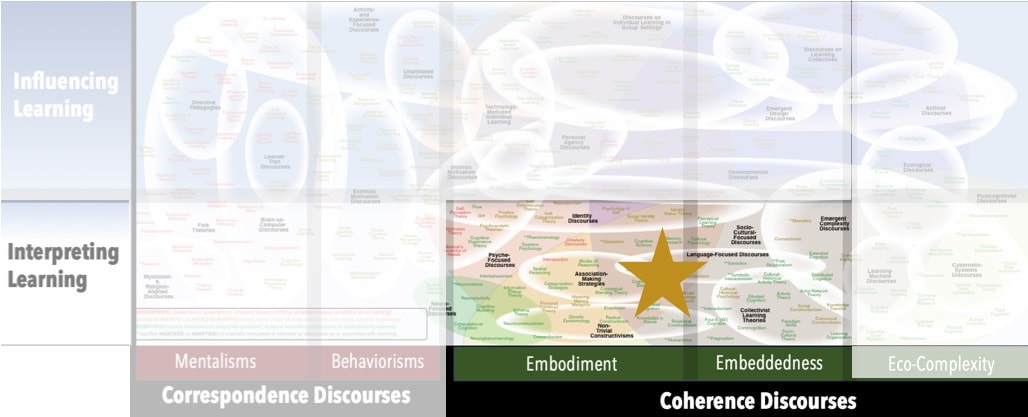AKA
Erikson's Stages of Psychosocial Develepment
Focus
Qualitative shifts in modes of cognitionPrincipal Metaphors
- Knowledge is … range of developmental possibility
- Knowing is … stage-influenced interpretations of prior construals
- Learner is … a developing agent
- Learning is … construing and reconstruing
- Teaching is … occasioning, prompting, triggering, listening
Originated
1960sSynopsis
Psychosocial Development Theory combines sensibilities from Developmental Discourses and Psychoanalytic Theories in its identification of eight successive challenges that might be met by the individual. Each stage is described in reference to a Development Crisis:- Developmental Crisis (Erik Erikson, 1960s) – a challenge rooted in biological and/or sociocultural forces – which, if successfully reconciled, affords a virtue which enables the individual to live a more adjusted existence
- Trust vs. Mistrust (Erik Erikson, 1960s) – the first stage of Psychosocial Development Theory, spanning birth to approximately 1 year of age, during which the infant should learn that caregivers can be trusted. If caregivers do not provide adequate care, the child may never develop a trust or be willing to depend on adults
- Autonomy vs. Shame and Doubt (Erik Erikson, 1960s) – the second stage of Psychosocial Development Theory, spanning approximately ages 1 year to 3 years, during which the toddler should learn that they can independently control their actions and bodily functions. If one is shamed for one’s lapses during this stage, one may never develop senses of personal control or self-efficacy
- Initiative vs. Guilt (Erik Erikson, 1960s) – the third stage of Psychosocial Development Theory, spanning approximately ages 3 years to 6 years, during which the child should learn they can exert influence during play and other social interactions. If one is unsuccessful during this stage, one may doubt oneself, be reluctant to take leadership roles, and lack initiative
- Industry vs. Inferiority (Erik Erikson, 1960s) – the fourth stage of Psychosocial Development Theory, spanning approximately ages 6 years to 12 years, during which the child should develop a sense of pride in skills and achievements relative to other children. If one is unsuccessful during this stage, one may be left with senses of incompetence and inferiority
- Identity vs. Role Confusion (Erik Erikson, 1960s) – the fifth stage of Psychosocial Development Theory, spanning approximately ages 12 years to 18 years, during which the adolescent should develop a coherent and continuous sense of identity. If one is unsuccessful during this stage, one may suffer from role confusion and be left with a weak or unstable sense of self
- Intimacy vs. Isolation (Erik Erikson, 1960s) – the sixth stage of Psychosocial Development Theory, spanning approximately the late-teens to the early-40s, during which the young adult should form loving and intimate relationships with others. If one is unsuccessful during this stage, one may be left feeling lonely and isolated
- Generativity vs. Stagnation (Erik Erikson, 1960s) – the seventh stage of Psychosocial Development Theory, spanning approximately the early-40s to the mid-60s, during which the adult should develop a sense of accomplishment by, e.g., seeing children grow into adults, mentoring, effecting positive change, and/or creating things that will outlast them. If one is unsuccessful during this stage, one may be left with a sense of futility, stagnation, or lack of purpose
- Integrity vs. Despair (Erik Erikson, 1960s) – the eighth and final stage of Psychosocial Development Theory, starting approximately in the mid-60s, during which the older adult looks back on and assesses the life lived as either adequate or wasted
- Encore Years (Third Chapter; Adulthood II) (various, 2010s) – a stage of radical self-redefinition experienced upon retirement by some “high-flyers” – who, typically, are upper middle-class and well educated, and who have tended to define their identities in terms of their careers
Commentary
As with many 20th-century Developmental Discourses, the research subjects for Psychosocial Development Theory were mainly white American males, presenting complex gender, racial, classist, and cultural limitations. As well, the rather precise sequences and age ranges posited by the theory are often criticized, although authors were cautious to build in multiple qualifications and cautions – in particular, asserting that the stated ages are more about periods of prominence than actual ranges.Authors and/or Prominent Influences
Sigmund Freud; Erik Erikson; Joan EriksonStatus as a Theory of Learning
Psychosocial Development Theory is a theory of learning.Status as a Theory of Teaching
Psychosocial Development Theory is not a theory of teaching, but it has been argued to afford insight into what may or may not be learnable by individuals at different points in their lives, according to theory ability or willingness to negotiate challenges. For example, a child in first grade who has been unable to develop a stable sense of Hope or a robust sense of Will is unlikely to be especially prepared to engage with the spectrum of learning demands, ranging from those associated with focused skills (e.g., reading, basic arithmetic) to social competencies (e.g., friendships, respect of adult authority).Status as a Scientific Theory
Psychosocial Development Theory is supported by coherent and focused programs of research, and proponents claim a substantial research base. Detractors frequently accuse researchers of theoretical and methodological flaws, and those accusations are sufficiently supported to suggest that Psychosocial Development Theory may not fully meet our criteria of a scientific theory.Subdiscourses:
- Autonomy vs. Shame and Doubt
- Developmental Crisis
- Encore Years (Third Chapter; Adulthood II)
- Generativity vs. Stagnation
- Identity vs. Role Confusion
- Industry vs. Inferiority
- Initiative vs. Guilt
- Integrity vs. Despair
- Intimacy vs. Isolation
- Trust vs. Mistrust
Map Location

Please cite this article as:
Davis, B., & Francis, K. (2023). “Psychosocial Development Theory” in Discourses on Learning in Education. https://learningdiscourses.com.
⇦ Back to Map
⇦ Back to List
